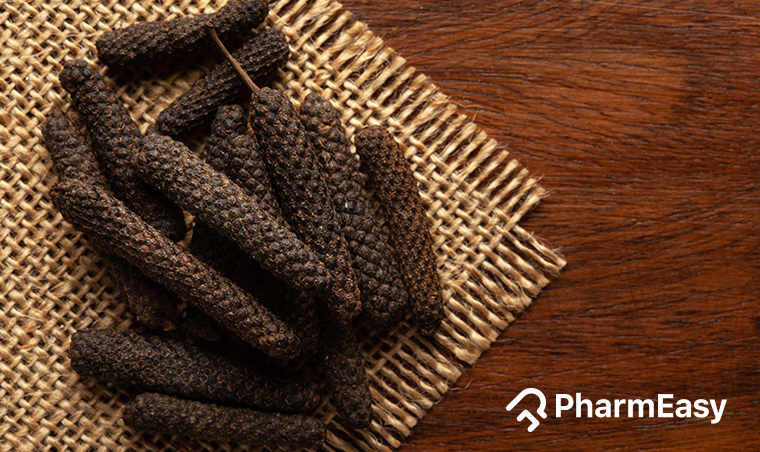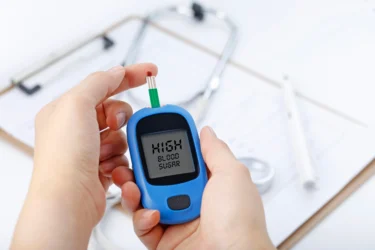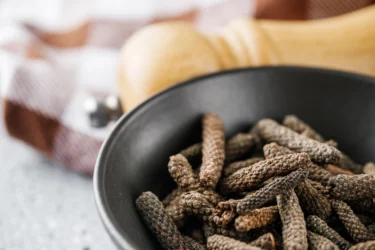
Introduction
Piper longum L, also known as long pepper or pippali is a common culinary plant that has long been utilized as an important component of several indigenous medicines, particularly in Ayurveda1. Long pepper is found throughout the world’s tropical and subtropical regions, including the Indian subcontinent, Sri Lanka, the Middle East, and the Americas. Because of its commercial and economic importance, it is believed that the Roman emperors cherished it even more than black pepper2.
Uses of Pippali
Pippali contains many phytochemicals, including alkaloids as important secondary metabolites (piperine and piperlongumine) flavonoids, essential oils, and steroids.
Some of the therapeutic uses of pippali are listed below:
- Anti-inflammatory and analgesic
- Antioxidant
- Antimicrobial
- Anticancer
- Anti-parkinsonian
- Anti-stress
- Nootropic
- Anti-epileptic
- Anti-hyperglycemic
- Hepatoprotective
- Anti-hyperlipidemic
- Anti-platelet
- Immunomodulatory
- Anti-arthritic
- Anti-ulcer
- Anti-asthmatic
- Anthelmintic3
Benefits of Pippali
1. Insecticidal Benefits of Pippali
- According to studies2 the fruits essential oil had insecticidal and insect repellent properties.
- In addition, piperidine alkaloids (pipernonaline and piperoctadecalidine) obtained from P. longum, had insecticidal action.
2. Antifungal Activity of Pippali
- P. longum L. has fungicidal properties in the essential oil of the fruits.
- In addition, Pipernonaline, a piperidine alkaloid, has a potential fungicidal effect against P. recondita2.
3. Antimicrobial Activity of Pippali
- P. longum extracts have shown antimicrobial activity against bacterial pathogens such as S. albus, S. typhi, P. aeruginosa, E. coli, and B. megaterium, as well as one fungus, A. niger2.
4. Antiamoebic Benefits of Pippali
- According to animal studies2, Entamoeba histolytica infecting the caecum was inhibited by a crude methanol extract of Piper longum fruit.
- In addition, the severity of caecal wall ulceration was lessened.
- The fruit and root of P. longum have an approximately similar antiamoebic effect.
5. Immunomodulatory Activity of Pipplai
- According to animal and laboratory studies, piperinic acid, one of the active ingredients in pippali, has been shown to reduce lymphocytes (CD4+ and CD8+ T cells) and cytokine levels in a dose-dependent manner.
- The alcoholic extract of P. longum fruits and its component piperine have immunomodulatory and anticancer properties.
- The fruits’ alcoholic extract and piperine were proven to be cytotoxic. 100% giardicidal activity was found in an aqueous extract of P. longum fruit powder. P. longum protects from stress generated by the environment.
- In mice infected with Giardia lamblia, a popular Ayurvedic preparation containing long pepper in pippli rasyana was evaluated and found to activate macrophages significantly, as indicated by an enhanced phagocytic activity2.
6. Anti-diabetic Effects of Pippali
- As per animal studies2, oral administration of dried fruits of Pippali has been proven to have strong anti-hyperglycemic, anti-lipid peroxidative, and antioxidant properties.
7. Antioxidant Benefits of Pippali
- A combination of different Piper spices, salts, and herbs shows antioxidant activity. Piper nigrum has the highest antioxidant activity, followed by piper longum2.
8. Benefits of Pipaali as a Cardioprotective Agent
- As a non-competitive thromboxane A2 receptor antagonist, a component of P. longum suppresses platelet aggregation.
- As per animal studies, piperine, pipernonaline, piperoctadecalidine, and piper longumine, all isolated from the fruits of P. longum, showed dose-dependent inhibitory activity on platelet aggregation induced by collagen arachidonic acid (AA) and platelet-activating factor (PAF), except for thrombin-induced platelet aggregation.
- The inhibitory effects of piperlongumine were more potent than those of other acidamides2.
9. Antidepressant Benefits of Pippali
- In animal studies, treatment with piperine for 72 hours reversed the corticosterone-induced decline in brain-derived neurotrophic factor (BDNF) mRNA expression in cultured hippocampal neurons.
- Piperine, a known piperidine alkaloid with potent antidepressant-like properties mediated in part through inhibition of Monoamine oxidase (MAO) activity, was isolated from the ethanol extract from the fruits of P. longum using a bioassay-guided method and thus represented a promising pharmacotherapeutic candidate as an antidepressant agent2.
I recently read in a study suggesting Pippali functions by boosting the availability and absorption of micronutrients to thyroid tissues in hypothyroidism. From my experience, Pippali may have a beneficial effect on the thyroid profile and may lower the initial symptoms of primary hypothyroidism7.
Dr. Siddharth Gupta, B.A.M.S, M.D (Ayu)
How to Use Pippali?
Pippali can be used in the following ways:
- In traditional medical practice, Piper longum leaves are mashed in a wooden bowl with a bit of water and used to cleanse a person’s chest with probable breast cancer.
- The fruits can be used as a whole. Traditional therapies for intestinal distress have used the fruits, with the ripe fruits being used as an alternative to a tonic4.
Your Ayurvedic physician will prescribe you the form and dose as per your needs.
From my experience, the extracts of Pippali may help against snake venom. Studies suggest that the extracts of Pippali significantly reduced the venom’s ability to cause death6.
Dr. Rajeev Singh, BAMS
Side Effects of Pippali
- When consumed by mouth, the Indian long pepper fruit is probably safe.
- There isn’t enough credible information to tell if Indian long pepper is safe or what the potential adverse effects are when it’s used as medicine5.
Also Read: Drumstick Tree (Moringa oleifera): Uses, Benefits and Side Effects By Dr. Rajeev Singh
Precautions to Take with Pippali
The following points should be kept in mind while using Pippali:
- Blood sugar levels may be affected by Indian long pepper. In theory, ingesting more Indian long pepper than that in food could alter blood sugar regulation in people with diabetes. As a result, diabetes drugs may need to be dosed differently.
- There isn’t much evidence to know if Pippali is safe to use as a medicine during pregnancy or lactation. Hence, it should be avoided during pregnancy and lactation.
- In theory, ingesting more Indian long pepper than that used in food could raise the risk of bleeding in persons who have bleeding disorders.
- Taking Indian long pepper in higher doses than those found in food could theoretically create bleeding issues or influence blood sugar levels during surgery. At least two weeks before surgery, you should stop taking Indian long pepper in quantities greater than those used in meals5.
Also Read: Majuphal (Gall Nuts): Uses, Benefits, Precautions & More!
Interaction with Other Drugs
1. Interaction of Pippali with Phenytoin
Indian long pepper may enhance the amount of phenytoin absorbed by the body. Taking Indian long pepper with phenytoin may increase phenytoin’s effects and side effects5.
2. Interaction of Pippali with Propranolol
Indian long pepper may increase the amount of propranolol absorbed by the body. Taking propranolol with Indian long pepper may increase the drug’s effects and side effects5.
3. Interaction of Pippali with Theophylline
Theophylline absorption can be increased by eating Indian long pepper. Taking theophylline with Indian long pepper may increase theophylline’s effects and adverse effects5.
4. Interaction of Pippali with Cyclosporine
Piperine is a phytochemical found in Indian long pepper. Piperine may raise cyclosporine levels in the body. Taking Indian long pepper with cyclosporine could theoretically increase the drug’s effects and side effects. However, not enough is known about this potential interaction to determine whether it is a major problem5.
5. Interaction of Pippali with Liver Enzymes
The liver changes and breaks down several drugs. Some drugs may be broken down more slowly by the liver if you take Indian long pepper. Taking Indian long pepper with certain drugs that are broken down by the liver could raise the risk of side effects. If you are taking any medications that are affected by the liver, consult your doctor before taking Pippali.
6. Interaction of Pippali with Anti-diabetic Medications
Piperine is a substance found in Indian long pepper. Piperine has been shown to lower blood sugar levels, according to some studies. In theory, Indian long pepper could interact with diabetes medicines, causing blood sugar levels to drop dangerously low. If you take Indian long pepper, keep a watchful eye on your blood sugar until further information becomes available.
Also Read: Babool (Acacia Nilotica): Uses, Benefits, Side Effects and More!
Frequently Asked Questions (FAQs)
Where does pippali grow? P. longum is a South and Southeast Asian, and Indo-Malayan native. It grows in north-eastern India, from Nepal’s southern border to Bengal and Assam, and has also been transplanted to Kerala in the southwest of the peninsula3.
What are the different phytochemicals present in Pippali seeds? The extract from Piper longum seeds has been shown to contain dihydroxyphenolics and hydroxydopamine. In addition, P. longum has also been shown to contain D asparatic acid, cysteine, n-eicosane, p-methoxyacetophenone, n-Heneicosane, methyl 3,4,5 trimethoxycinnamate, n-octadecane, phenylethanol, serine, n-triacontane, and L-tyrosine3.
How does pippali affect the reproductive system of humans? Pippali is a natural contraceptive. Pippaliyadi vati, an ayurvedic contraceptive, contains equal parts of powdered seeds or fruit berries of Embelia ribes, the fruit of P. longum, and borax powder. It is embryotoxic and teratogenic. As per animal and human studies, the foetuses of pippaliyadi-fed mothers had low birth weights, were shorter in length, and gained less weight during pregnancy2.
References
- Choudhary N, Singh V. A census of P. longum’s phytochemicals and their network pharmacological evaluation for identifying novel drug-like molecules against various diseases, with a special focus on neurological disorders. PLOS ONE. 2018;13(1):e0191006. Available from: https://journals.plos.org/plosone/article?id=10.1371/journal.pone.0191006
- Khandhar, Amit & Patel, Samir & Patel, Archita & Zaveri, Maitreyi & Lecturer, Sr. (2010). Chemistry and pharmacology of Piper Longum L. International Journal of Pharmaceutical Sciences Review and Research. Volume 5. 67-76. Available from: https://www.researchgate.net/publication/257299404_Chemistry_and_pharmacology_of_Piper_Longum_L
- Yadav, V., Krishnan, A., & Vohora, D. (2019). A systematic review on Piper longum L.: Bridging traditional knowledge and pharmacological evidence for future translational research. Journal of Ethnopharmacology, 112255. doi:10.1016/j.jep.2019.112255. Available from: https://www.researchgate.net/publication/336117227_A_systematic_review_on_Piper_longum_L_Bridging_traditional_knowledge_and_pharmacological_evidence_for_future_translational_research
- Salehi, B., Zakaria, Z. A., Gyawali, R., Ibrahim, S. A., Rajkovic, J., Shinwari, Z. K., Khan, T., Sharifi-Rad, J., Ozleyen, A., Turkdonmez, E., Valussi, M., Tumer, T. B., Monzote Fidalgo, L., Martorell, M., & Setzer, W. N. (2019). Piper Species: A Comprehensive Review on Their Phytochemistry, Biological Activities and Applications. Molecules (Basel, Switzerland), 24(7), 1364. Available from: https://doi.org/10.3390/molecules24071364
- INDIAN LONG PEPPER: Overview, Uses, Side Effects, Precautions, Interactions, Dosing and Reviews [Internet]. Webmd.com. 2022 [cited 13 February 2022]. Available from: https://www.webmd.com/vitamins/ai/ingredientmono-369/indian-long-pepper.
- Sharma A. Review on the medicinal importance of Pippali (Piper longum Linn.) in prospective of Ayurveda. International Research Journal of Modernization in Engineering Technology and Science. 2023 Feb;5(2). DOI: 10.56726/IRJMETS33566. Available from: https://www.irjmets.com/uploadedfiles/paper/issue_2_february_2023/33566/final/fin_irjmets1676629370.pdf
- Shah SB, Guttal GK, Chikkanna U, Sajjanar NJ. Efficacy of Pippali in vardhamana and fixed dosage pattern in primary hypothyroidism – A randomized clinical trial. J Ayurveda Integr Med. 2022 Jun 2;13(2):100555. doi:10.1016/j.jaim.2022.100555. Available from: https://www.sciencedirect.com/science/article/pii/S0975947622000146
Disclaimer: The information provided here is for educational/awareness purposes only and is not intended to be a substitute for medical treatment by a healthcare professional and should not be relied upon to diagnose or treat any medical condition. The reader should consult a registered medical practitioner to determine the appropriateness of the information and before consuming any medication. PharmEasy does not provide any guarantee or warranty (express or implied) regarding the accuracy, adequacy, completeness, legality, reliability or usefulness of the information; and disclaims any liability arising thereof.
Links and product recommendations in the information provided here are advertisements of third-party products available on the website. PharmEasy does not make any representation on the accuracy or suitability of such products/services. Advertisements do not influence the editorial decisions or content. The information in this blog is subject to change without notice. The authors and administrators reserve the right to modify, add, or remove content without notification. It is your responsibility to review this disclaimer regularly for any changes.
 16
16
 1
1 

































Comments